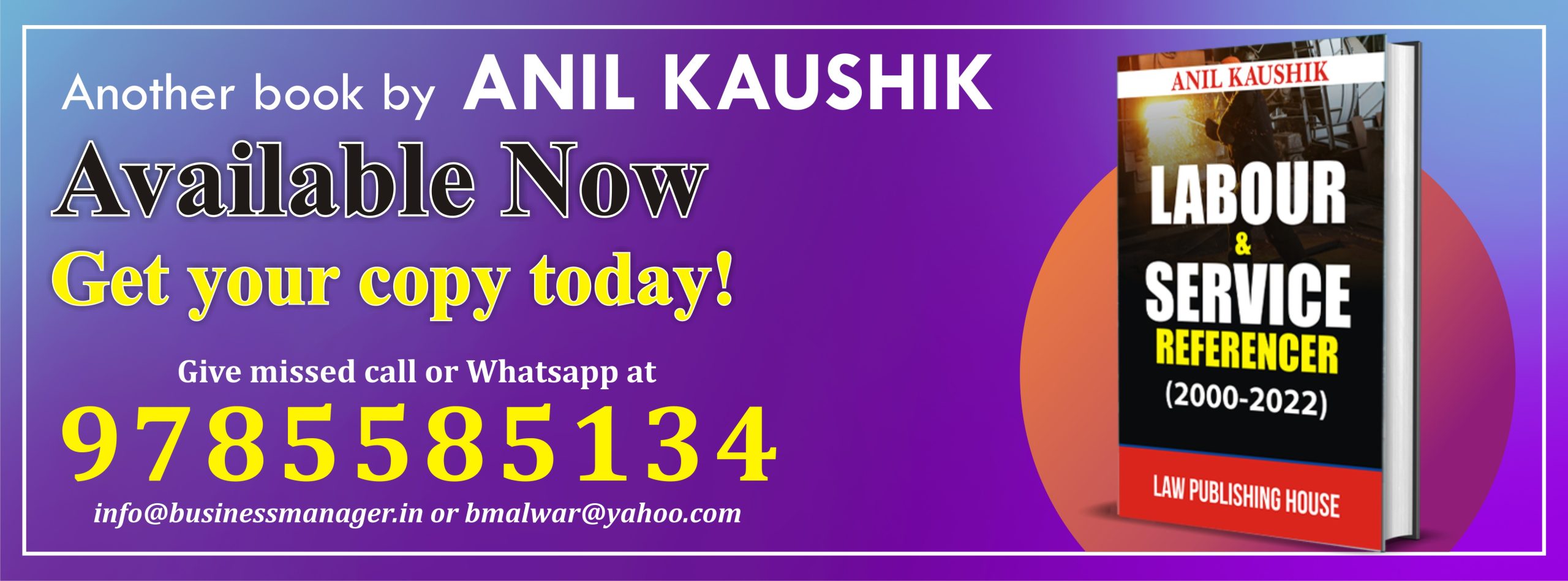Meaningful Conversations Hold The Key
Ladies and Gentlemen, I welcome you to this 9th IR Summit of National HRD Network, titled ‘Industrial Relations for the Industry 4.0 and the Beyond.’
It is always a good idea to review the situation and take bearings again which is what such Summits do, and they are for that reason valuable. The overall situation on the IR front is extremely bad or very good depending on which side of the table one sits. But summits are not for taking sides. Summits are for reflections, they are for a relook at the purpose which industrial relations must serve, and they are for understanding the scenario. Moreover, such summits are also help us be ready for the future.
I will take this opportunity to describe the situation as I see it, and suggest the direction in which we should work. I have divided my keynote address in two parts:
The Threats and Opportunities in Industrial Relations situation today, and The Gig economy and platform workers and What needs to be done.
The Threats and Opportunities in Industrial Relations Situation Today
The recent strike by United Auto Workers caught the imagination of many people. They were very assertive in getting their demands accepted. The union demanded a 40 percent wage increase over the next four years. The justification was that the compensation packages for the chief executives had increased about that much, on average, over the last four years.
Bernie Sanders has supported the strikers. Bernie Sanders ‘is known for his opposition to economic inequality and neoliberalism, and support for workers’ self-management.’ He said, “The fight that you are waging here is not only about decent wages, decent benefits, and decent working conditions in the automobile industry. No. The fight you are waging is a fight against the outrageous level of corporate greed and arrogance that we are seeing on the part of CEOs who think they have a right to have it all and could [not] care less about the needs of their workers.”[1]
Corporate greed has never been so sharply brought in limelight at the global level. President Biden sent his emissaries to find a solution, and later joined them too. And interestingly, The Government of USA intervened in the dispute.
The situation is akin to ours; the corporate greed has touched exceptional levels, and the Government has by and large adopted the role of a bystander. Third party intervention is now a thing of the past.
Even the regular inspections have been done away with. Sixteen women died in the factory at Pirangut which worked without registration under the Factories Act for eight years. It was only last week that six more women lost their lives in an unregistered factory at Talawade near Pune. I am told that no inspection is allowed without the authorization of the Chief Inspector of Factories. We have swiftly moved from Inspection Raj to No Inspection, and we are seeing the consequences. At Wistron, workers regularly worked twelve-hour shift every day and the contractor delayed payments. They set it right because Apple put Wistron on probation, meaning, they put them under the scrutiny. Apple achieved what the Government of Karnataka could not.
I am not standing here as the champion of workers; I wish to say that certain rights and laws came in to force after a long struggle and they are seen as embodying good values which our Society recognizes. Those values have been given a short shrift.
It has been a fall out of the liberalization, globalization, and the neoliberal economic policies.
The weakened unions which have lost all teeth are silently witnessing huge employment of flexible workforce – trainees, contract labour, fixed time employment workers. The political leaders who were so keen to represent workers have deserted them for better pastures. I asked Google ‘How many MPs represent workers in the parliament’ or those with the trade union background, and I drew a blank. Even Google does not know.
The situation is not peculiar to India; it is happening worldwide, but that cannot be a consolation for us.
The purpose of industrial relations is to create a good workplace which in turn is essential for creating an equitable society. We cannot lose sight of this objective.
Is there an opportunity in this situation? I surely see one. It is to create a monolithic organization, one which does not recognize the plurality in terms of workers and management, but treats the entire organization as one homogeneous group. And that requires change of attitude. My impression is that those organizations which have adopted Japanese way of managing, like Toyota Production System may be closer to this ideal than the traditional Indian way. There are of course exceptions to this statement and I am not going to take any names.
I would once again like to emphasis the need and possibility of creating a monolithic organization. That holds huge challenges for the management. The first would be to create and implement a common policy of people management. If you search ‘IR policy’ on the website of Indian companies you are unlikely to find it. Discussion ought to begin from that point.
And creating a monolithic organization will not be difficult with techniques like LSIP (Large Scale Interactive Process), Open Space Technology and World Café in our hands. This is both an opportunity and a challenge for the industrial relations professionals.
Industrial Relations are built on four pillars: Respect, Equality, Safety, and Trust. It is possible to do it in the present circumstances. LSIP, Open Space Technology and WorldCafe are based on these very four principles and create conversations for change.
Also read: Employee quits on being asked to produce Doc prescription for sick leave
Industrial Relations and Industry 4.0
Industry 1.0 began in 1780 was about mechanization, Industry 2.0 began in 1870 represented Electrification, Industry 3.0 started in 1970 represented Automation, Industry 4.0 began in 2011 is all about Digitization and Industry 5.0 which started in 2020 is Personalization and Humanization.
The Industry 5.0 has already arrived! Nevertheless, I will go back to industry 4.0 since that is the theme today.
I have learnt two new words. Digitization and Digitalization. Digitization means converting and recording data in computerized form, digitalization is all about developing processes and changing workflows to improve manual systems. Technologists believe that singularity will be achieved by 2031. This is the moment when artificial intelligence will equal or exceed human intelligence. One cannot even guess what it will mean to work ten years from now!
Before the 1990s, sales representatives were booking orders by filling up an order booking form. Now the dealers place orders directly on the website. The work flows have been transformed, and the data helps organizations to know what will improve the customer satisfaction. It guides them to take decisions. We are seeing that bots are used even in HR. And the use of robots in factories is not uncommon.
The transformation is happening all around us. They say that ‘the trouble with future is that it arrives before we are ready for it.’
The jobs of people are changing. I would like to focus on two specific aspects.
First, the employment relationships are getting blurred. Second, the disparity is increasing, it will further increase, creating a huge precariat.
The employment relationships are in a melting pot. We know the test of employment included control, supervision, employer deciding the conditions of employment, disciplinary action etc. All these are debatable in the case of platform workers.
The official number of the gig workers is 7.7 million or 77 lakhs according to the NITIE Ayog, but those in the know estimate it between 1 Cr to 1.25 Cr. The numbers will tell us how big is the problem of insecurity, because they have no social security. They have no employment security as well because the Code on Social Security also defines Gig workers as those who are outside the employer-employee relationship.
Rajasthan Government passed Rajasthan Platform Based Gig Workers (Registration and Welfare) Act, 2023 in July 2023. It provides for certain social security benefits. This seems to be a well drafted piece of legislation and Karnataka state is likely to follow with their similar law for the platform-based Gig workers.
But the issue is what happens to their employment related issues. When Ola and Uber started their business in India, the income and incentives to the drivers were substantial. Many drivers even bought another vehicle on loan. Then came a period when these platform companies reduced the plan so the earnings went down and so also incentives. There was a widespread unrest. How are such disputes to be settled? There is no alternative but for the Government to stand behind them. What the Government has proposed in the Code on Social Security is a social security benefits, but employment rights are yet a dream.
In some countries the platform workers have been declared to be the ‘employees’ and not ‘independent contractors,’ but it is not yet in India. There is a PIL pending in the Supreme Court of India which seeks social security and not employment rights.
Let us now turn our focus on what is in store for us as a society. This may not be in immediate future but we have already started seeing signs of change. Research points out that precariat will increase substantially. Precariat means people whose employment and income are insecure. The Ola and Uber drivers and many others fall in this category. Add to this the research finding that the next round of automation will adversely affect the service sector. ‘According to two Oxford professors who conducted a major study of more than 700 different service-sector occupations, half of all jobs in the American service sector are in danger of disappearing.’ This tsunami will hit India too, it would be only a question of time.
On one hand we will have transformed work places, with highest level of flexibility, optimizing on cost, and on the other hand we will have a huge precariat consisting of crores of people.
Even within the organizations, there will be two types of employees – those who are knowledge workers and innovation workers, and those who are on short or temporary contracts and more insecure jobs.
We will have a very interesting situation where the sensitivity to customer satisfaction and managing costs will be high, and security of employment will be very low. It will be constantly a trade off between sensitivity and security. And that is not going to be easy to handle.
So, we come back to two important questions: What kind of society we want to build? What kind of organizations we want to build?
None of us have complete answers to these questions but I would beg to submit that we know what would help us arrive at the answer. It is conversations. Gathering multiple perspectives helps us find a way. We have mastered the art of having minimum conversations while at work. That will not suffice.
David Bohm, the great scientist advocated ‘genuine supportive dialogue,’ which he claimed could ‘bridge and unify conflicting and troublesome divisions in the social world.’
Edgr Schein says, ‘Humble Inquiry is the fine art of drawing someone out, of asking questions to which you do not already know the answer.’ He wrote a book called ‘The Humble Inquiry’ and says, ‘The professional motivation to explore Humble Inquiry more extensively comes from the insights I have gained over the past fifty years of consulting with various kinds of organizations.’
The value of conversations in bringing about change and strengthening relationships cannot be overemphasized. Only conversations with various stakeholders, and that includes the employees lest we forget them, will help us create great organizations and equitable society to deal with the future effectively. And as I mentioned three tools are available to us.
With these submissions, I close my keynote address. Ladies and Gentlemen, I wish this Industrial Relations Summit a great success.
Article originally published at vivek’s world – https://vivekvsp.com/2023/12/industrial-relations/
[1] https://www.theguardian.com/business/2023/sep/15/bernie-sanders-uaw-auto-workers-strike-detroit-rally
Stay connected with us on social media platform for instant update click here to join our LinkedIn, Twitter & Facebook



























